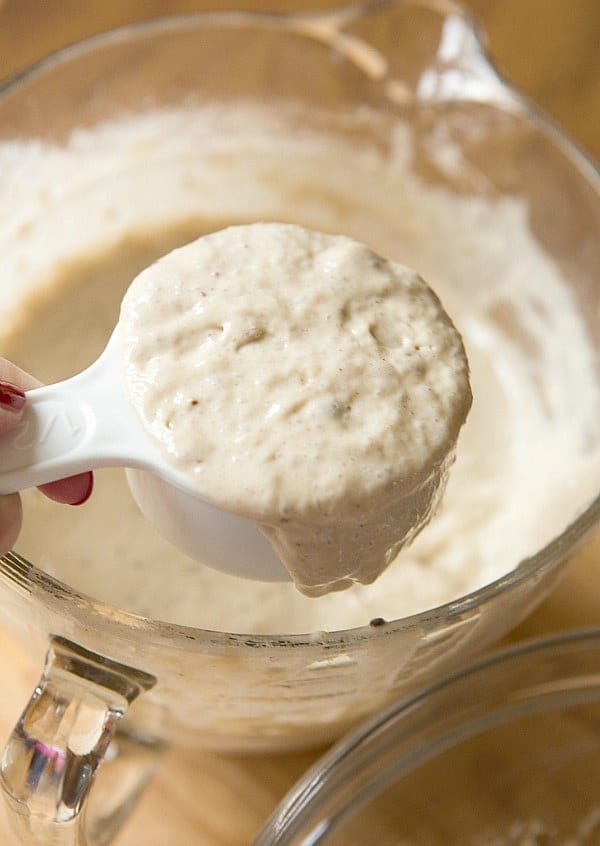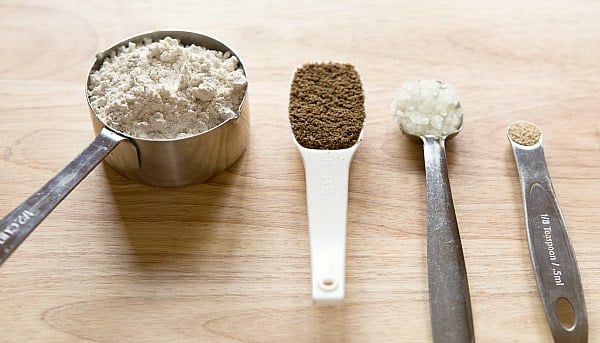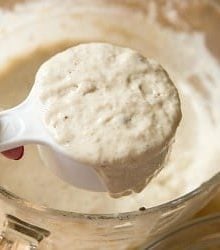How To Make Rye Sour Starter (for Jewish Rye Bread)

As they say, the third time’s the charm. Or, is it the fourth? Fifth?
I have been at odds with rye bread for years now. Years. After enjoying a fresh loaf of rye bread from a Jewish deli in Florida more than three years ago, I got the itch to make my own. Having made tons of yeast bread in the past, I thought there would be nothing to it. I was in for a rude awakening… an awakening that took the form of multiple failed attempts at a rye starter. Frustration mounted, and I put the project on the back burner for quite some time. A few months ago, I decided to try again. This time, I did what I should have done in the first place – I went straight to the source. Since I wanted to make Jewish rye bread, I figured the place to find the best recipe would be in a Jewish cookbook. Since I happened to have one that had been sitting on my shelf for quite some time unused, I busted it open. Sure enough, there was a recipe for Jewish rye bread. I followed the instructions to a “T” and didn’t run into any problems. I feel like the rye bread fairy godmother waved a magic wand. Finally, success!
Since the process to mix together the starter for this rye bread is somewhat involved and takes multiple days, I thought it would be easier to break the recipe down into the starter process, and then the actual mixing of the dough and baking the bread. Below you will find step-by-step instructions (with photos) on how to create a rye sour starter, which provides the bread with its soft texture and immense flavor.
Save This Recipe
Tomorrow I will share the bread recipe with you, so stay tuned!
[Update: Recipe for Jewish Rye Bread using this starter.]

One year ago: Bourbon Bread Pudding
Two years ago: Peanut Butter Cup Crunch Brownie Bars and Chocolate Malted Whopper Cookies
Three years ago: Pumpkin Scones with Spiced Glaze
Four years ago: Ham and Split Pea Soup
Five years ago: Almost Fudge Gateau

Rye Sour Starter
Ingredients
Rye Sour Starter:
- ½ cup (51 g) rye flour
- ⅛ teaspoon (0.13 teaspoon) active dry yeast
- 1 cup (250 ml) warm water, 110 degrees F
- 1 tablespoon crushed caraway seeds
- 1 teaspoon minced onion
Stage One:
- ½ cup (125 ml) water
- 1½ cups (153 g) rye flour
- 1 recipe Sour Starter
Stage Two:
- ½ cup (125 ml) warm water, 110 degrees F
- 1 cup (102 g) rye flour
Stage Three:
- ½ cup (125 ml) water, use warm water if sour has been refrigerated
- 1 cup (102 g) rye flour, or more
Instructions
- 1. Begin the Rye Sour Starter: Combine the rye flour, yeast, warm water, crushed caraway seeds and minced onion in a large bowl and stir with a wooden spoon until smooth. The mixture should have a thin, soupy consistency. Cover with plastic wrap and allow to stand in a warm spot until bubbly and fermented. It can be left for up to 24 hours.
- 2. Prepare Stage One: In a large bowl, combine the water, 1¼ cups of the flour, and the starter; stir with a wooden spoon until smooth. The dough should pull slightly and may start to come away from the sides of the bowl. Wipe down the sides of the bowl and sprinkle the remaining ¼ cup flour over the entire surface of the sour. Cover with plastic wrap and let stand until doubled in size and the floured top appears cracked with openings spread widely apart. This could take 4 to 8 hours (avoid letting the mixture collapse).
- 3. Prepare Stage Two: To the Stage One sour, add the water and ¾ cup of the flour; mix until smooth. Wipe down the sides of the bowl and sprinkle the remaining ¼ cup flour over the entire surface of the sour. Allow to rise in a warm area for 4 to 8 hours, or until doubled in size.
- 4. Prepare Stage Three: To the Stage Two sour, add the water and the 1 cup flour. Mix until smooth. Add more flour, ¼ cup at at time, until a dough-like consistency is reached. Cover with plastic wrap and leave in a warm spot until doubled in size, 4 to 8 hours. At this point, the starter is ready to be used in the bread.
Notes:
- The caraway seeds can be ground in a coffee or spice grinder or with a mortar and pestle.
- The book recommends using white rye flour, which I purchased from King Arthur Flour.
- When preparing Stages One and Two, the object is to make a thick consistency as close as possible to that of a soft dough. If the mixture is too soupy, add more flour ¼ cup at a time and mix until smooth.
- It is recommended that Stage One and Two be made on the same day, the second stage refrigerated overnight, and the third stage prepared the morning of baking. If you intend on baking the bread first thing in the morning, then prepare the third stage the evening before, so it can rise slowly all night and be ready in the morning.
- The sour starter can be refrigerated; it is recommended that it be stirred down every 3 to 4 days if it hasn't been used. Every 10 to 12 days, dispose of half of the starter and refresh it by mixing in equal amounts of rye flour and water. If there is some discoloration on top, it can be skimmed off.
Notes
Did you make this recipe?
Leave a review below, then snap a picture and tag @thebrowneyedbaker on Instagram so I can see it!





Michelle, Have you ever tried to substitute dry minced onion for the fresh minced onion? What is the purpose of the onion – flavor or does is aid in the fermentation and rising process? Thanks, Rob
I’m excited to try this recipe and I thank you for sharing!! Question: In stage 3, you say to keep adding flour until you have a dough consistency. The photos all look a bit soupy and not dough-like at all. Do I keep adding flour until it’s the consistency of bread dough, cookie dough (sticky), or way more wet than that?
Hi Jody, It will be a little wet, cookie dough is probably a good comparison.
Is it supposed to use dry minced onion, reconstituted, or “live, fresh” minced onion? I thought it sounded liked dried, but looking at your picture it looks like you used “fresh” onion. Which is it, or doesn’t it matter? Thanks.
Hi Mark, Fresh minced onion. Enjoy!
I’m new to breadmaking. How much volume is “1 recipe sour starter?” My friend just gave me 4 oz of her sourdough starter. Can I use that?
Hi Kelly, Unfortunately, I am not sure. I just made the recipe as written, making the whole sour starter and then using that moving forward with the recipe.
Do you have the bread recipe to go with this starter? Thank you in advance, Nancy
Yes, here it is! https://www.browneyedbaker.com/2013/02/20/jewish-rye-bread-recipe/
The timing of when to do what has me a little confused. It sounds like you should begi the with the starter on the first day anywhere from 12 to 24 hours before beginning stage one. So start the starter say at noon day one and leave it on the counter. Day two, morning, begin stage one and again leave on the counter. Day two afternoon/evening, begin stage two, allow to rise slighly at room temp, say two hours then move to the fridge to retard the process until morning. Day three, morning, begin stage three and leave it on the counter until doubled in size and use it in the afternoon or early evening for your bake. Once stage three is complete, then refriderate the starter and every three or four days, remove half and replenish with water and flour. Did I miss anything?
Hi John, I think you got it!
I can’t find rye flour in any of my stores. My German grandmother made sourdough rye bread every Saturday. It was wonderfull. I can’t wait to try it.
I have seen theis process before. I have a pumpernickel recipe that has these instructions in it and I have been meaning to try it. The pictures and comments are a big help.
I think your bread is just what I’m looking for! However, I need help! :) I made the sour starter and the bread but my loaf didn’t rise at all and was very flat. :( My sour was very thick and didn’t look like your pictures although I tried to carefully follow the instructions. I have baked white and oatmeal breads many times, but this is soooo different and I want to get this right. My folks loved Beefsteak Hearty Rye bread by Hostess and it isn’t made any longer. I have a feeling your recipe could be a delightful replacement. Do you have any suggestions for me? Thank you so much!
Hi Debi, I’m sorry you’re having some trouble. Starters can give you fits! As I mentioned, this was my third time around and sometimes they just flat-out fail. The consistencies will vary based on air temperature and humidity, but if things are rising correctly then you should be good to go. If you aren’t making any substitutions or adjustments, I would try it again. Good luck! :)
Would sour dough starter work here?
Yes, you could, you just wouldn’t have the depth of rye flavor from the crushed caraway seeds in the starter.
I really like sourdough bread and I really like rye bread…this is the best of both breads :) Can’t wait to try this!!
Hi, it’s not called Jewish Rye Bread… It’s just Rye Bread. Thanks
It’s great that you kept at a rye bread recipe. I always think that if I keep working at something I’ll figure it out.
I love bread so much!
I have to confess I’ve never made rye bread, but something tells me your tutorial is going to have me itching to get it done before long!
I love how all of your measuring spoons come from different sets. It reminds me of my kitchen! I’m going to pass this on to my husband, who is our family bread baker. Can’t wait to see the next installment.
Thank you so so much for this! I am a rye bread lover. It is my favorite. Before I knew you had to approach rye like sourdough, I tried and tried and wasted many expensive bags of flour with hard bricks of not baked bread. Ugh! I am so pinning this, because I am making my own rye this weekend!
Perfect timing with this!! Making rye bread was on my list of things to do today, but I still hadn’t found a recipe. I’ll have to make the starter today in anticipation for the recipe tomorrow! Thanks.
Love the details and the photos, thanks for sharing :)
I’m so happy to see this recipe! I’ve also been trying to make a 100% Rye Bread with sour rye starter for years with no real success. Any chance you’ve got a picture of a baked loaf ?
Coming tomorrow, with the recipe for the bread!
Awesome! Looking forward to it!
So excited to try this! I’ve done rye, but just let it ferment all day – not necessarily used a starter.
Oh wow! I’ve been wanting to try making a starter for a while now; this post is just the push I needed to finally do it! Any idea on whether to use a dark rye flour or light rye?
Hi Cecilia, The book actually mentioned white rye flour, which I purchased from King Arthur Flour. I’ll update the notes above to reflect that. Thanks for the question!
Looks like it is going to be great!
Yikes. This is so impressive. I’m still gaining a lot of confidence baking with yeast in general but the next step is definitely starters. Thanks so much for the step-by-step pictures. It helps immensely!
Will this starter work for Swedish Limpa Rye? I love the molasses and orange in that bread, and have looked for a simpler way for making it than the recipe I have which was my grandmothers.
Hi Cindy, I’ve never made Swedish Limpa Rye, so unfortunately I can’t say for sure. If it’s a recipe that utilizes a sour starter, though, I definitely think it would be worth a try!
I am not sure. I know my recipe called for scalded milk, orange and not sure what else. I wonderd the same thing.
This is beyond fantastic! I’ve always wanted to learn how to make my own starters – and for rye bread? I’m SO THERE! And the photos in the recipe plugin is just fantastic, I’ll have to learn how to do that in my plugin. That’ll help so much!
So impressive!! I love the way you’re breaking it down – makes it seem more doable! Going to put this on my bucket list! :)
This sounds like a perfect recipe to start on Friday night!! I have to give this one a whirl this weekend! Thanks for the great recipe! I can’t wait it give it a try!
Can’t wait to try this. I’ve made regular sourdough before but never rye!
Wow. So impressive. I brew kombucha and kefir and play with plenty of yeast and cultures, but making my own (rye) sourdough starter is not one I’ve yet tackled. I am so impressed you stuck with it and now have your own starter!